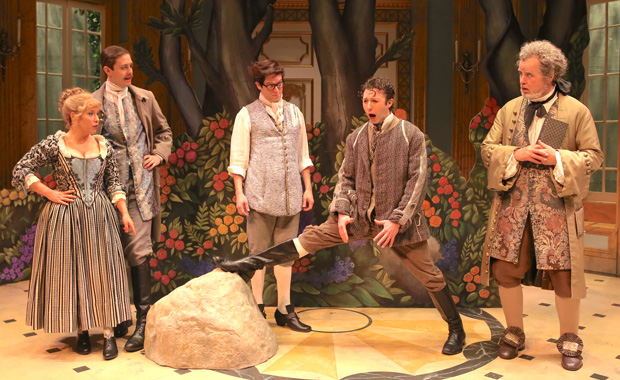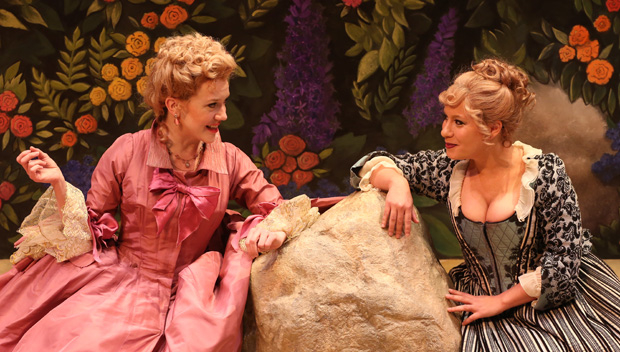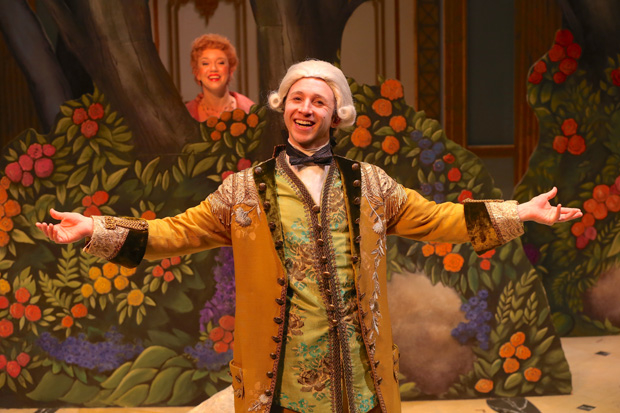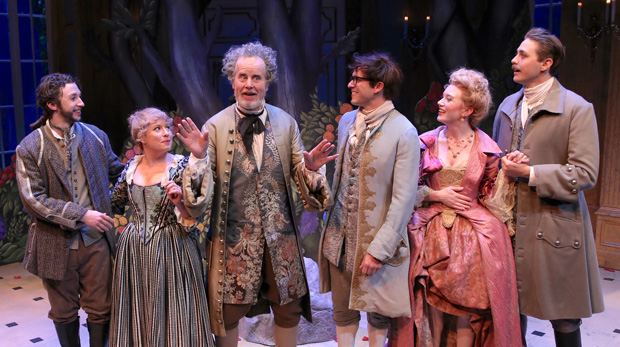The Metromaniacs Takes Rhyming to the Max
David Ives pens an English-language adaptation of a 1738 French comedy — completely in rhyming couplets.

(© Carol Rosegg)
We theater maniacs find ourselves naturally drawn to The Metromaniacs, the latest 18th-century French comedy lovingly ripped off by David Ives. Based on La Métromanie, Alexis Prion's scandalous 1738 play, it is not about, as one character suggests, a craze for subways. Rather, metromania is, "An inflammation of the mental bursa / Where verse becomes your vice – and vice-a-versa." Ives himself might be suffering from a case of metromania: His last two plays in New York, The Liar and The Heir Apparent, were similarly adapted from preexisting French plays and presented entirely in rhyming couplets. Like those earlier efforts, The Metromaniacs is bubbly, skillful, and un peu ennuyeux.
It takes place in the Paris home of Francalou (Adam LeFevre), a wealthy amateur poet who writes tedious plays in rhyming verse. He lives with daughter Lucille (Amelia Pedlow), maid Lisette (Dina Thomas), and a poetry-writing guest named Cosmo de Cosmos, who is actually the poet Damis (Christian Conn) in disguise. Francalou despises Damis, and when Damis's valet Mondor (Adam Green) arrives, he threatens to blow his cover. A young suitor of Lucille named Dorante (Noah Averbach-Katz) and Damis's Uncle Baliveau (Peter Kybart) also show up. Everyone pretends to be someone else, and these mistaken identities result in some very compromising encounters — but it's nothing that a few forced rhymes and a champagne toast cannot remedy.

(© Carol Rosegg)
Ives describes the play as "a comedy with five plots, none of them important," which is correct. Intriguingly, Piron was inspired by a real-life misunderstanding between Voltaire and a mysterious Breton poetess, but if you don't want the finale of this play spoiled, I suggest you refrain from reading the program note until after.
Undoubtedly, many audience members will thrill at Ives's virtuosic wordplay, guffawing when he rhymes "exhibits" with "kibbitz," and howling when a character remark that uncivilized Breton women carry "Brittany spears." I chuckled too, but unmoored from real stakes, I found my mind floating out to sea.
This is despite a zippy production by director Michael Kahn and delightfully physical performances from the cast. Everyone delivers the verse with crisp precision, so all the jokes land. The hyper-animated Green is a delight to watch, and Thomas is wickedly funny as Lisette. Pedlow also conjures a prodigious vocal fry for Lucille, blurring the lines between then and now in a way that feels natural for the text.

(© Carol Rosegg)
As was the case with The Liar, Murell Horton's fantastic costumes regularly steal the show: Dorante's magenta coat, featuring an embroidered vine creeping down from his left shoulder and across his waistcoat, was a standout in this 18th-century runway show. Set designer James Noone convincingly renders a marbled ballroom, adding cardboard cutout set pieces for Francalou's play. The setup offers the actors plenty of hiding places for mischief, and some stage business with a fake rock never fails to get a laugh. The colors pop under Betsy Adams's bright lighting, while Adam Wernick's original baroque music puts us in the right frame of mind from the outset.
Everything about The Metromaniacs is well done, which might explain why I left feeling as though I had spent one hour and 45 minutes chewing on a tough steak. It's all perfectly digestible, but tiresome on the taste buds. It is possible to simultaneously recognize Ives's craftsmanship without particularly enjoying the end product. He cannot be accused of falling short of his goals: He wanted to create a fluffy gossamer entertainment, and he did. We shouldn't be surprised when the memory of that entertainment floats away like a cobweb in the breeze.

(© Carol Rosegg)








